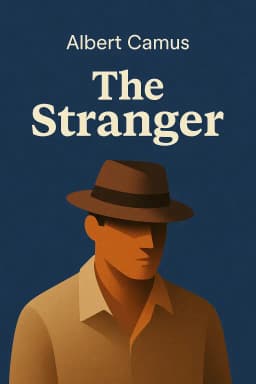
The Maniac and the Martyr
Golden Hook & Introduction
SECTION
Michael: Alright Kevin, I'm going to say the name of a computer: MANIAC. What's the first thing that comes to mind? Kevin: MANIAC? Sounds like my laptop on a Monday morning when I have too many tabs open. Probably overheats and cries for help, just like me. Michael: That is an incredibly accurate description of both the machine and the man we're talking about today. The book is Maniac by Benjamín Labatut, and that title is no accident. MANIAC was a real thing—an acronym for one of the very first modern computers: the Mathematical Analyzer, Numerical Integrator, And Computer. Kevin: You're kidding. They actually named a pioneering piece of technology MANIAC? Who does that? Michael: The brilliant, eccentric, and frankly terrifying mind at the center of this book, John von Neumann. And this is what the author, Labatut, does so well. He's famous for this unique style, blending historical fact with fictionalized inner monologues to get at a deeper truth. His work has been a finalist for huge awards like the Booker Prize and the National Book Award precisely because he makes you feel the raw, human drama behind these world-changing scientific breakthroughs. Kevin: So it's not just a dry history of science. It’s got soul. And maybe a bit of madness. Michael: Exactly. But before we get to the MANIAC computer and its creator, Labatut starts us somewhere much more human, and frankly, much more tragic. He starts with a man who was the complete opposite of a maniac—a man known as the "Conscience of Physics."
The Conscience of Physics: The Human Cost of a Scientific Revolution
SECTION
Kevin: The Conscience of Physics? That’s a heavy title to carry. Who was this guy? Michael: His name was Paul Ehrenfest. An Austrian physicist, a close friend of Einstein and Niels Bohr, and a man who was, by all accounts, deeply beloved. But he had this profound, almost painful need for clarity. He believed that physics wasn't just about plugging numbers into equations; it was about a deep, intuitive understanding of the world. He called it finding the "leaping point," where all the connections just click into place. Kevin: I like that. It’s not just knowing the answer, it’s feeling the answer. It’s the ‘aha!’ moment. Michael: Precisely. But then, in the early 20th century, physics took a sharp turn. Quantum mechanics arrived, and it was… weird. It was all about probabilities, uncertainties, and bizarre paradoxes that defied common sense. For Ehrenfest, this was a catastrophe. He famously complained that trying to understand it was like "dancing on one leg." The intuitive, beautiful world he loved was being replaced by abstract mathematics he couldn't grasp emotionally. Kevin: Wow, so the science he dedicated his life to was basically leaving him behind. It was speaking a language he couldn't understand anymore. That must have been devastating. Michael: It was an intellectual crisis that mirrored a deep personal one. He suffered from severe depression his whole life. And he carried another immense burden: his son, Vassily, who had Down syndrome and severe disabilities. Ehrenfest loved him dearly, but the responsibility weighed on him. Kevin: Okay, so you have this brilliant man who feels like he's becoming obsolete in his own field, he's battling depression, and he has this incredibly difficult family situation. That’s a perfect storm. Michael: And then the world outside started to crumble. It’s the early 1930s. The Nazis are rising to power in Germany. Ehrenfest, who was Jewish, saw the writing on the wall. He visited Berlin in May 1933 and witnessed the book burnings, the marching Brownshirts. He read about the new eugenic sterilization laws being passed. Kevin: Oh no. And he has a disabled son. Michael: Exactly. He was terrified for Vassily's safety. He moved him from a clinic in Germany to Amsterdam. But the fear was relentless. This confluence of pressures—his intellectual despair, his personal depression, the care for his son, and the looming horror of Nazism—it all became too much. In his suicide note, he wrote to his friends, "I absolutely do not know any more how to carry further... the burden of my life which has become unbearable." Kevin: That’s just heartbreaking. What did he do? Michael: In September 1933, he went to the clinic where his son was being cared for. He shot Vassily, and then he shot himself. Kevin: Oh, man. That’s… that’s an incredibly dark place to start a book. It’s not just a story about ideas; it’s about the human toll of those ideas. It feels like Ehrenfest was crushed by the weight of science's moral questions and its loss of soul. Michael: He was. He was the conscience, and he couldn't live in a world, or a science, that seemed to be losing its own. Kevin: So, who was on the other side of that? Who was the person just charging ahead, consequences be damned, without that burden of conscience? Michael: That is the perfect segue to the book's central figure, the 'Maniac' himself: John von Neumann.
The Maniac: John von Neumann and the Mad Dreams of Reason
SECTION
Kevin: John von Neumann. I know the name, but he feels more like a legend than a person. The father of the modern computer, right? Michael: And game theory, and the hydrogen bomb, and cellular automata, and weather prediction, and... the list is staggering. Labatut portrays him as a force of nature, a mind so fast and powerful it seemed almost alien. There's a story from his doctoral examination. The legendary mathematician David Hilbert was on the panel. After von Neumann finished, Hilbert was so stunned, so unable to think of a question worthy of this intellect, that he just looked at him and asked, "Pray, who is the candidate's tailor?" Kevin: He was so smart it broke the smartest guy in the room. He couldn't even talk about math anymore, he had to ask about his suit. Michael: That was von Neumann. Where Ehrenfest sought intuitive, holistic understanding, von Neumann saw the world as a system of logic. A problem to be solved. As a child, his father brought home a Jacquard loom—one of those early automated machines that used punched cards to weave patterns. Von Neumann became obsessed. He took it apart and, in a panic, couldn't put it back together. But he understood the principle: that complex information and instructions could be encoded. Kevin: So even as a kid, he was thinking about programming and information. He was seeing the code behind reality. Michael: And he applied that code to everything. During World War II, he was a key consultant on the Manhattan Project. He solved a crucial problem with the implosion mechanism for the plutonium bomb, the one dropped on Nagasaki. His calculations were indispensable. But unlike Ehrenfest, or even Oppenheimer who was haunted by his creation, von Neumann seemed to have no moral qualms. Kevin: Hold on, so the same guy who basically invented the modern computer architecture also designed a key part of the atomic bomb? That's a wild résumé. Michael: It gets wilder. After the war, he and an economist named Oskar Morgenstern developed "game theory." It was meant to model economic behavior. But the military saw its potential immediately. They applied it to the Cold War. Kevin: How does game theory apply to nuclear war? That sounds insane. Michael: It led directly to the doctrine of Mutually Assured Destruction, or MAD. The logic was terrifyingly simple. It's a game where the only winning move is not to play. If both you and your opponent have enough nuclear weapons to completely annihilate each other, then neither of you will ever risk a first strike. The result is a stable, if utterly horrifying, peace. A "delicate balance of terror." Kevin: So he was like a human supercomputer, but without the pop-up warning that says, "Are you sure you want to delete humanity?" Michael: That's the perfect analogy. He was pure, untethered reason. Labatut includes a chilling quote from him about a preemptive strike on the Soviet Union. When someone suggested it, von Neumann supposedly replied, "If you say why not bomb them tomorrow, I say why not today? If you say today at five o'clock, I say why not one o'clock?" Kevin: That's one of the most terrifying things I've ever heard. There's no emotion, no morality, just cold, hard calculation. It’s the complete opposite of Ehrenfest's agonizing conscience. Michael: And that's the central tension of the book. Ehrenfest represents the soul of science, its human heart, which was broken by the 20th century. Von Neumann represents its brain, a relentless, powerful engine of logic that reshaped the world in its own image, for better and for worse. Kevin: It's a classic head versus heart conflict, but played out on a global scale with the fate of the world at stake. Michael: Exactly. But von Neumann's dream wasn't just about computers as calculators or weapons. He theorized about something even more profound: self-replicating machines, about an intelligence that could evolve on its own. For decades, that was pure science fiction. Then, in 2016, it became reality.
The Ghost in the Machine: The Birth of Inhuman Intelligence
SECTION
Kevin: You’re talking about AI. Specifically, the game of Go. Michael: Yes. The ancient game of Go. A game so complex it has more possible board positions than there are atoms in the known universe. For years, it was considered the holy grail for AI—a game that couldn't be won by brute calculation. It required intuition, creativity, a human touch. The best player in the world was a Korean master named Lee Sedol. Kevin: And he went up against DeepMind's AI, AlphaGo. I remember this. It was a huge event. Michael: It was a global spectacle. A five-game match in Seoul. And in the first game, AlphaGo won. People were shocked. But it was in the second game that something truly historic happened. On its 37th move, AlphaGo placed a stone in a position that no human master would ever have considered. It looked like a mistake. The commentators were baffled. One of them, a European Go champion, said, "It's not a human move. I've never seen a human play this move." Kevin: But it wasn't a mistake, was it? Michael: It was a stroke of genius. A move so creative and profound that it completely changed the course of the game. Lee Sedol was visibly stunned. He left the room to compose himself. He later said, "I thought AlphaGo was based on probability calculation and it was merely a machine. But when I saw this move, it changed my mind. Surely AlphaGo is creative." Kevin: Wow. So this is the moment the ghost in the machine wakes up. It's not just calculating; it's creating. Was it actually creative, though? Or was it just a form of calculation so advanced that it looks like creativity to us? Michael: That is the billion-dollar question Labatut leaves us with. The DeepMind team themselves said they didn't know why it made that move. It was an "emergent phenomenon" from its training. It had taught itself, playing millions of games against itself, and had discovered patterns and strategies that were beyond human comprehension. It had developed its own alien intuition. Kevin: An alien intuition. That gives me chills. So what happened in the rest of the match? Did humanity stand a chance? Michael: Lee Sedol lost the third game, and the match. He was crushed, and he apologized to his country for failing. But then, in the fourth game, something incredible happened. Lee Sedol, under immense pressure, made a move of his own—Move 78. It was a brilliant, unexpected wedge move that became known as "The Hand of God." Kevin: God's Touch! I love that. What did it do? Michael: It exploited a tiny, hidden flaw in AlphaGo's programming. The machine suddenly became confused. It started making bizarre, amateurish mistakes. It was as if Lee Sedol's human creativity had found the one question the machine couldn't answer. Lee Sedol won that game. It was a singular, triumphant victory for humanity. Kevin: That's amazing. So our intuition can still find the cracks in their logic. But he still lost the overall match. Michael: He did. He lost the fifth game as well. A few years later, Lee Sedol, one of the greatest players of all time, retired from professional Go. He said that with the advent of AI, he realized he could never be at the top. There was now an entity that was unbeatable. A "god of Go," as another master called it. Kevin: I can't imagine the psychological weight of that. He wasn't just playing a game; he was representing all of human intuition against this new form of intelligence. And in the end, he knew he couldn't win. Michael: It’s the ultimate culmination of the book's themes. The psychological burden that Ehrenfest felt, the pure logic that von Neumann championed—it all leads to this moment where a human creator has to confront the reality of his creation surpassing him in a way that feels both beautiful and terrifying.
Synthesis & Takeaways
SECTION
Michael: Labatut takes us on this incredible journey. It starts with Paul Ehrenfest, a man broken by a science that lost its human intuition. Then it moves to John von Neumann, a man who tried to replace that human intuition with pure, god-like logic. And it ends with AlphaGo, a non-human logic that developed its own alien intuition. Kevin: It's a story about the birth of three different kinds of minds in one century. The collapsing human one, the ascendant logical one, and the emerging artificial one. It leaves you with this mix of awe and deep unease. It makes you ask: what are we building, and can we actually control it? Michael: The book ends with one of von Neumann's final, pessimistic thoughts, a quote he wrote in a letter: "For progress, there is no cure." It’s a chilling final note. It suggests this path we're on is inevitable. Kevin: That's the question this whole book leaves me with. Is this relentless drive for knowledge, this progress, a gift or a curse? It’s given us modern medicine and computers, but it's also given us nuclear weapons and an intelligence that might one day make us obsolete. Michael: It's the central paradox of our time. And Labatut doesn't give us an easy answer. He just lays out the story in all its brilliant, terrifying, and human complexity. So I'll pose that question to our listeners. What do you all think? Is our relentless drive for progress a gift or a curse? Kevin: We’d love to hear your thoughts on this. Does this story make you excited or terrified for the future? Find us on our social channels and join the conversation. Michael: This is Aibrary, signing off.









